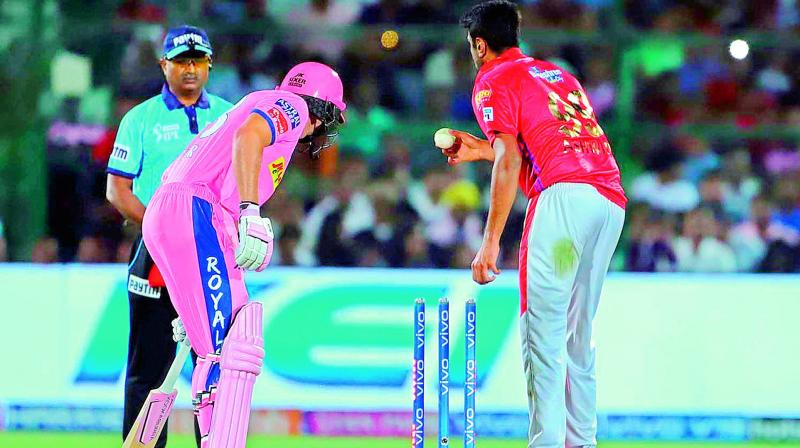Spirit of the game is voluntary, Jos Buttler was in the breach

The first week of the IPL produced stunning performances and topsy-turvy results, but these were overshadowed by two controversies that sparked wide debate among players, fans and indeed even the apex administrative bodies of the sport.
Ravichandran Ashwin `mankading’ Jos Buttler had the entire cricket world riveted but also deeply polarized. Had Ashwin, especially since he was also captain of the King’s XI team, inflicted a body blow to the ‘spirit of cricket’?
However, even before this controversy had exhausted its ‘debate’ value, as it were, another erupted after Mumbai Indians won a last-over, edge-of-the-seat thriller against Royal Challengers Bangalore.
The rousing climax was however sullied by the fact that the last ball of the innings bowled by Malinga – with RCB still theoretically in contention to win or tie the match – was a no ball that the umpire failed to spot.
Both these events were unrelated and also extraordinary. But even given the rarity of such incidents, the extent of examination and argument among stakeholders that followed suggest intriguing ramifications for the sport going ahead.
What these could be remains to be seen, but rather than discuss possible amendments or changes that can come, it is important to understand what caused these events to happen.
Ashwin’s act raised right royal brouhaha as it tested the very premise of ‘spirit of cricket’, which is a sort of unwritten, lofty moral code running concurrently with the laws that govern the game.
Problem arises when this moral code and the laws run into conflict. In the Ashwin-Buttler case, the law is clear: If the non-striker leaves the crease prematurely, he can be run out by the bowler.
The ‘spirit of the cricket’, as understood by convention, was that the errant non-striker be given a warning. The law does not make a warning obligatory.
Indeed, seeing the rampant exploitation of convention by greedy non-strikers, the MCC revised the law in 2017.
Earlier, the bowler could run out the non-striker before he got into his delivery stride. Now, he can do so up to the ‘point of release’ of the ball.
Nonetheless, this still leaves the situation vague, as point of delivery can always be technically debated.
In fact, even the MCC indulged in a flip-flop in the Ashwin case by first giving the bowler a clean chit in the Buttler dismissal, and a day later submitting that by delaying the delivery, he had acted against the spirit of the game.
This brings the issue back to square one. Is the spirit of the game more important than the law? In modern sport, with it’s cut-throat competition and win-at-all-costs ethos, it’s a vexing question that has no clear answer.
My opinion is that playing that the laws are obligatory, and any decision based on the spirit of the game is voluntary. If a player wants to subscribe to the ‘spirit’, it is his choice. But conforming to the law is without choice.
So Buttler, whichever way one sees it, was in the breach. There could be some regret that he was dismissed the way he was, but there can be no dispute because that is what the law provides for.
The larger debate in the Ashwin-Buttler matter arose because the amended rule, 41.16, is still vague.
If, for instance, the non-striker was disallowed from leaving his crease till the ball was actually delivered, and not ‘till the point of release’, it would be easier for players and umpires to handle.
Where the second controversy is concerned, it is a straightforward issue about using technology available to the hilt. Since the third umpire has non-stop access to visuals of action on the field, should he not step in when he sees an obvious mistake being made by the on-field umpire?
Support for treating the mistake made by the umpire in the MI-RCB match as ‘human error’ has got only muted support.
Most fans, and more importantly players – present and past – believe that since the technology is available, not using it is folly.
Are we then headed for cricket without on-field umpires? My hunch is that this could happen sooner than imagined!

